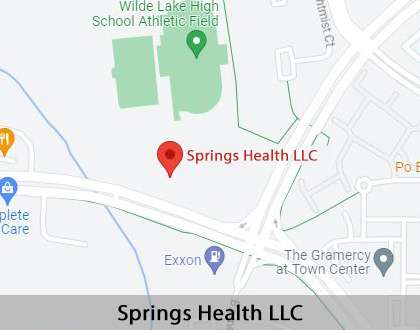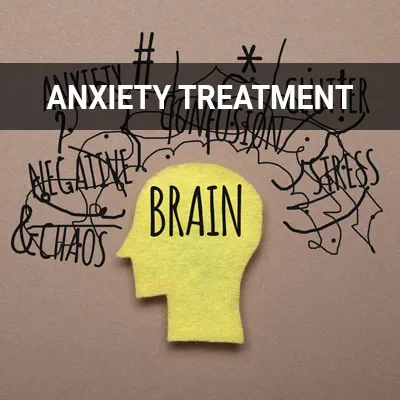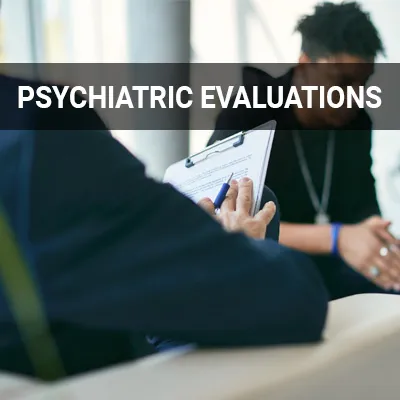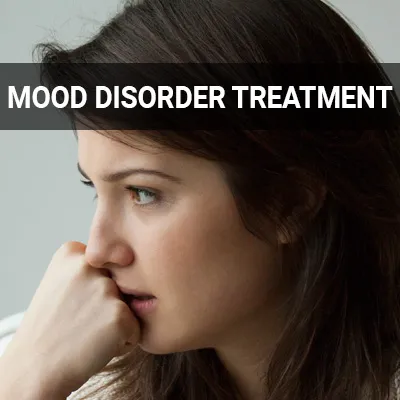Depression Treatment Columbia, MD
Although depression can significantly affect a person's life, it is highly treatable through various forms of depression therapy. People with depression may experience continued feelings of sadness and a loss of interest in activities they once enjoyed. Fortunately, patients can choose from a range of therapeutic options depending on their unique needs, medical history, and preferences. The right treatment and support can help those with depression manage their symptoms and find relief.
Do not hesitate to seek treatment for your depression. Our team at Springs Health LLC in Columbia and the surrounding area provides depression therapy to help patients improve their symptoms and reclaim their lives. Call us today at (410) 772-0774 to learn more about our services or schedule an appointment.
Understanding Depression
Depression, also called major depressive disorder, is a mood disorder that affects how people feel, think, and act. While it is normal to feel sad at times, people with depression may feel intense sadness or apathy towards life for many days to weeks at a time. This mood disorder can even lead to emotional and physical problems, interrupting people's ability to function at work and home. Luckily, depression is a treatable medical condition.
Different types of depression are categorized based on the severity of the patient's symptoms. It may be necessary to add one or more specific features to diagnose the type of depression. Some specific features, or specifiers, include anxious distress, simultaneous depression and mania, melancholic features, atypical features, catatonia, peripartum onset, or a seasonal pattern. The most common forms of depression include:
- Major depressive disorder with seasonal pattern: This is also known as seasonal affective disorder (SAD). It is related to less daylight during the fall and winter months and usually lifts in response to light therapy or warmer months. People in countries with longer and more intense winters are more affected by this seasonal pattern of depression.
- Major depression: People with major depression experience constant sadness. They may also lose interest in activities they previously enjoyed.
- Persistent depressive disorder: Persistent depressive disorder is also known as dysthymia. People with this form of depression may experience forms of major depression or milder symptoms.
- Postpartum depression: After giving birth, women can experience postpartum depression. This change in mood occurs when hormone levels readjust after childbirth. This type of depression does not have one specific cause and can remain for months or years.
“Depression, also known as major depressive disorder, is a mood disorder that affects how people feel, think, and act.”
Signs and Types of Depression
There are specific symptoms that determine whether a person is depressed or experiencing normal feelings of sadness. According to the DSM-5, a diagnostic manual for treating mental disorders established by the American Psychiatric Association, a person may have depression if they experience five or more of the following symptoms for at least two weeks:
- Depressed mood for a majority of the day
- Difficulty concentrating, remembering, making decisions
- Feeling tired or having a lack of energy almost every day
- Feeling worthless or guilty nearly every day
- Hopelessness or pessimism
- Losing or gaining weight
- No interest or pleasure in many activities
- Restlessness or slowing down
- Sleeping too much or too little every day
Not every person with depression will experience every symptom. Some people may only experience a few symptoms, while others may experience many. Fortunately, many people can overcome depression with the proper diagnosis and treatment. It is important to understand that depression is not the same as feelings of sadness or grief that people may experience throughout their lives.
It is normal and healthy for people to experience sadness or grief in response to certain situations, such as the death of a loved one or the end of a relationship. While a person can experience both grief and depression simultaneously, distinguishing between the two is necessary for patients to get the right therapy. Anyone experiencing symptoms of depression can benefit from working with a professional to start addressing their mental health needs.
“Anyone experiencing symptoms of depression can benefit from working with a professional to start addressing their mental health needs.”
Possible Causes and Risk Factors of Depression
Depression is one of the most common mental health disorders. The Anxiety & Depression Association of America states that depression affects around 40 million adults in the United States, or 18.1% of the population each year. While a person can have depression at any age, it often begins in adulthood. Some risk factors for depression may include a family history of depression, major life changes, stress or trauma, and certain illnesses or medications.
The exact cause of depression is not yet known. According to current research, a combination of genetic, biological, environmental, and psychological factors may play a role in causing depression. For example, a 2018 study found significant structural differences in the frontal lobe, thalamus, striatum, parietal lobe, and hippocampus of people with depression. Additionally, a person's brain chemistry may increase their risk for depression if the neurotransmitters or chemicals in the brain are not functioning normally. Changes in hormone levels from pregnancy, menopause, or other conditions can also cause symptoms of depression.
“According to current research, a combination of genetic, biological, environmental, and psychological factors may play a role in causing depression.”
Check out what others are saying about our mental wellness on Yelp: Depression Therapy in Columbia, MD
Depression Treatment Options
Depression is one of the most treatable mental disorders. According to the American Psychiatric Association, 80-90% of people with depression will eventually respond positively to treatment. There are many effective treatments and strategies to help people cope and overcome this disorder. Working with a mental health professional gives people the information, support, and personalized treatment they need to relieve their symptoms. The treatment a patient will receive depends on the type of depression and the severity of their symptoms.
One or more treatment methods may be necessary. Two of the most common depression treatments are therapy and medication. Since there are many types of antidepressants, patients may need to try a few before finding the one that works best for them. In some cases, combining two antidepressants or an additional type of medication, such as an anti-anxiety medication or mood stabilizer, is necessary to help an antidepressant work. People with depression may also engage in therapy with a mental health professional. During these treatment sessions, patients will regularly talk with a therapist about their depression and other concerns to help treat their symptoms.
As with medication, there are various therapy methods available, from cognitive behavioral therapy to talk therapy. A combination of antidepressant medications and therapy is effective for many people. However, people may benefit from trying other treatments such as electroconvulsive therapy (ECT) and transcranial magnetic stimulation (TMS) when medication is ineffective. ECT is a therapeutic option that stimulates the brain by passing electric currents through the brain to help neurotransmitters work more effectively. TMS involves sending magnetic pulses through the brain to stimulate the nerve cells that regulate a person's mood.
“According to the American Psychiatric Association, between 80-90% of people with depression will eventually respond positively to treatment.”
Questions Answered on This Page
Q. What are the signs and types of depression?
Q. What are the possible causes and risk factors of depression?
Q. What are some treatment options for depression?
Q. What should patients expect from depression treatment?
People Also Ask
What To Expect From Depression Treatment
Depression treatment will vary for each person. There is no one size fits all approach, and what works for one person may not work for another. Our team plans an appropriate treatment based on the patient's specific symptoms, diagnosis, and preferences. Patients undergoing therapy can expect to work with a therapist who will help them develop strategies to identify and avoid any triggers that worsen their depression. A therapist can also help patients with depression develop healthy coping mechanisms for when they experience a trigger.
Talk therapy can help people with temporary to mild depression, while those with severe depression may need additional medication. Patients should feel comfortable and safe speaking to their therapist. Discussing their feelings and overall treatment plan openly during therapy sessions allows therapists to make changes as needed. A patient may need to meet with several therapists to find the one that works best for their needs. People taking antidepressants may take their medication for a short period or long-term, depending on their needs. Our team takes various factors into account before prescribing any medication to a patient.
Some of the factors to consider include the possible side effects, cost, possible drug interactions, and the patient's current health concerns and symptoms. When first starting depression treatment, it can be easy to get discouraged and want to stop. People should expect to undergo a few months of therapy before noticing improvements. It can take antidepressants six to eight weeks to start taking effect. Remaining dedicated to a treatment plan is crucial for optimal treatment results. Patients should not stop treatment without consulting their doctor or therapist first. Finding the right treatment plan is often a process of trial and error. If one treatment does not work, it is okay to move on and try others.
“Remaining dedicated to a treatment plan is crucial for optimal treatment results.”
Frequently Asked Questions
Q. How can I tell if I am making progress with my depression therapy?
A. Patients may find it useful to list short and long-term goals within the first few weeks of therapy. This list can help people track how they feel each day and how they cope with each situation. Then, check back at the list periodically to see if they are closer to reaching their goals. While improvements will not happen immediately, patients should see some changes, even if they are small.
Q. What happens during transcranial magnetic stimulation (TMS)?
A. During a TMS session, patients will sit in a chair and wear earplugs while an electromagnetic coil goes against their scalp by their forehead. A magnetic pulse painlessly stimulates the brain region's nerve cells that play a role in mood control and depression. While the exact science of why TMS works is not completely understood, it may impact how the brain works and eases depression symptoms to improve mood. The procedure takes about 40 minutes. Some temporary scalp discomfort may be present during and after the procedure. Patients can typically return to their normal activities right away.
Q. What are the possible side effects of antidepressants?
A. There are several types of side effects that people may experience after starting antidepressants. In some cases, there may be an increase in suicidal thoughts. These thoughts are usually temporary and only last a few days, improving in a majority of cases. Another possible side effect is physical restlessness, which causes people to feel as if they need to keep moving. People taking antidepressants may also experience sexual side effects, drowsiness, weight gain, dry mouth, fatigue, dizziness, and nausea. Most initial side effects are temporary and disappear within a week. However, people experiencing persistent side effects may need to switch medications.
Q. Is there anything I should not do while taking antidepressants?
A. People with depression should not drink alcohol. While alcohol can give people some short-term relief from their symptoms, it typically worsens depression in the long term. In addition, antidepressants can cause people to get more intoxicated while drinking less alcohol. Alcohol can also lower a person's inhibitions, including ones against suicide and self-destructive behavior. Some clinicians believe that marijuana can interfere with antidepressants. Also, people should be aware that potential interactions are possible between any two medications.
Q. How long will I have to take antidepressants?
A. People will usually continue taking antidepressants for about six months after they experience symptom improvements. While patients may want to stop taking their medication as soon as they feel better, abruptly stopping can greatly increase the chance of a relapse.
Change Is Possible - Call Us Today
Life isn't always easy. Are you struggling? Are you looking for a highly personalized and professional approach tailored to your individual needs? Instead of waiting around, call us today. You should know that there is hope for a better tomorrow.
Definitions
- Electroconvulsive therapy
- Electroconvulsive therapy is a procedure commonly used to treat major depression that involves brief brain electrical stimulation.
- Major depressive disorder
- Major depressive disorder is a mood disorder during which the person suffers symptoms for 2 weeks or more. These symptoms include feeling sad and empty every day, losing interest in what one once enjoyed, feelings of worthlessness, thoughts of suicide, and trouble falling asleep or sleeping more than usual. The symptoms can be so severe they interfere with daily responsibilities.
Call Us Today
Do not ignore your depression and let it interfere with your life. Our team at Springs Health LLC offers customized depression therapy to help patients overcome their depression and live the lives they want. Call us today at 410-772-0774 to learn more about our services or schedule an appointment.
Helpful Related Links
- Agency for Healthcare Research and Quality. Agency for Healthcare Research and Quality. 2023
- American Psychiatric Association (APA). American Psychiatric Association (APA). 2023
- Psychology Today. Psychology Today. 2023
- The American Board of Professional Psychology. The American Board of Professional Psychology. 2023
- The American Journal of Psychology. The American Journal of Psychology. 2023
- The National Association of Behavioral Healthcare. The National Association of Behavioral Healthcare. 2023
About our business and website security
- Springs Health LLC was established in 2021.
- We accept the following payment methods: American Express, Cash, Discover, MasterCard, and Visa
- We serve patients from the following counties: Howard County
- We serve patients from the following cities: Columbia, Clarksville, North Laurel, Ellicott City, and Savage
- National Provider Identifier Database (1689198350). View NPI Registry Information
- Norton Safe Web. View Details
- Trend Micro Site Safety Center. View Details
Back to top of Depression Therapy








